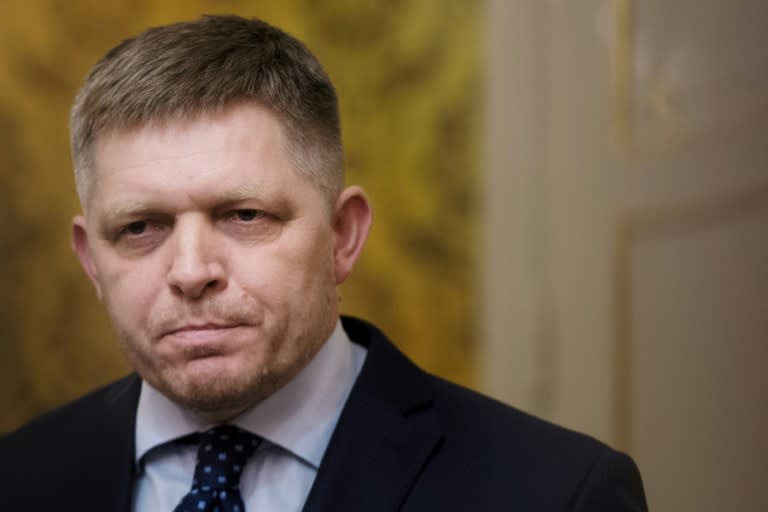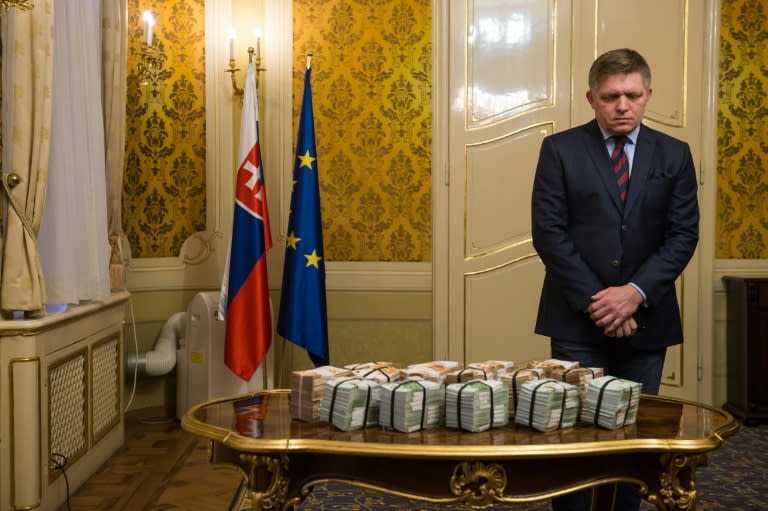Slovakia's Fico: Anti-migrant leftist haunted by dead journalist
Slovakia's veteran leftist Robert Fico, who offered to step down as prime minister on Wednesday amid tensions sparked by the murder of a journalist, has always been a polarising figure in the ex-Communist EU member. Alternately hailed as a tenacious and savvy politician and condemned as a populist demagogue who has peddled hatred of refugees, the 53-year-old Fico has spent ten years overall in the prime minister's chair. His latest stint has apparently drawn to a close less than a month after the murder of young journalist Jan Kuciak and his fiancee, who were found shot dead on February 25. The crime sparked a wave of anti-government sentiment across Slovakia as Kuciak had pointed out links between the Italian mafia and Fico's government in his last article published posthumously. Fico's critics have immediately pointed out his aversion to journalists whom he once called "dirty, anti-Slovak prostitutes", "plain, silly hyenas" and "slimy snakes." Announcing his resignation, Fico insisted he would propose a new prime minister from his own Smer party. He used the opportunity to lash out at the right-wing opposition, saying Smer would not "hand the state over without any reason to the opposition amateurs and loudmouths." A lawyer by profession, Fico launched his political career in the Communist Party just before the 1989 Velvet Revolution swept away the regime in former Czechoslovakia, ushering in capitalism and democracy. - From court to cabinet - The no-nonsense Fico burnished his EU credentials as Slovakia's representative to the European Court of Human Rights in Strasbourg from 1994 to 2000. During that time, he was overlooked for a ministerial post by the Democratic Left Party (SDL) -- the Communist Party's political heir -- in 1998. He unceremoniously quit the party the following year to set up his own, the Smer-Social Democrats (Smer-SD). The gamble paid off in 2006 when Smer-SD scored a parliamentary landslide, catapulting Fico into the prime minister's seat two years after Slovakia joined the EU. It was then that the leftist leader first forged a coalition with the far-right Slovak National Party (SNS), which shares his staunch anti-refugee rhetoric and populist leanings. Fico shrewdly capitalised on the global financial crisis in 2008-9 to bolster his popularity by refusing to impose austerity measures. Slovakia's 2009 eurozone entry crowned Fico's first four-year stint as prime minister, but elections in 2010 sent him back to the opposition as he failed to form a coalition despite coming out top. But he was back two years later, scoring a landslide win in a 2012 snap election following the infamous fall of a centre-right coalition amid corruption allegations. Fico, whose Smer won a majority in parliament in the vote, suffered a blow in 2014 when Andrej Kiska, a philanthropist and political novice, beat him to the Slovak presidency. - No to Muslims - Tensions between the two have become a hallmark of Slovak politics. After Kuciak's murder, Kiska called for a sweeping cabinet reshuffle or even snap elections, a proposal slammed by Fico as "an attempt to totally destabilise our country." Smer went on to win the last election in March 2016, but it lost the parliamentary majority. The current government includes Smer, the small Hungarian Most-Hid party and the SNS. When the recent refugee crisis swept Europe, Fico took one of the toughest stances in Europe, refusing to take any decision "which would give rise to a distinct Muslim community in Slovakia" and slamming the EU's quota programme to redistribute refugees. But he has gradually backed down and called for closer co-operation with EU powerhouses France and Germany. Born on September 15, 1964, Fico shrugs off "populist" and "demagogue" labels, despite famously insisting that "the strong and the rich" should bear the costs of consolidating public finances. Fluent in English, Fico enjoys fast cars, football and roller-skating. He is married to fellow lawyer Svetlana with whom he has a son, Michal.



